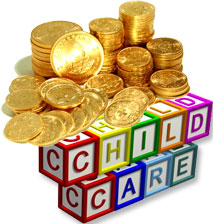This is an archive of news stories and research from the National Union of Public and General Employees. Please see our new site - https://nupge.ca - for the most current information.
'Over the long term, every $1 invested in quality child care programs returns $2.54 in benefits to society.' - CCAAC.
 Ottawa (2 Oct. 2009) - The Harper government should invest in child care programs as an effective way to stimulate the economy, says the Child Care Advocacy Association of Canada (CCAAC).
Ottawa (2 Oct. 2009) - The Harper government should invest in child care programs as an effective way to stimulate the economy, says the Child Care Advocacy Association of Canada (CCAAC).
The association says a new study confirms that child care provides one of the largest - if not the biggest - boost to economic activity of any sector.
"Figuring out the best investment for tax dollars to stimulate the economy should be child's play for the government if it reads this important report," says CCAAC Chair Jody Dallaire. "As an economist, Prime Minister Harper should quickly realize that funding child care programs is not just the right thing to do for parents and children, but also the smart thing to do for Canada."
Dallaire says the study by the Centre of Spatial Economics on workforce shortages in Canada shows that any investment in the sector would practically pay for itself immediately while creating much-needed jobs. The study included an analysis of the estimated economic and social impact of child care programs.
"While the government is promoting its $1,350 tax credit for home renovations, this study found that every $1 million invested in the child care sector creates about four times more jobs than putting it into the construction sector," Dallaire notes.
The CCAAC says the study adds to a longstanding body of evidence that cannot be ignored: the public benefits of quality child care programs outweigh the public costs. Yet the Conservatives have dramatically reduced spending on early childhood education and care to about $600 million a year, down from $950 million in 2006, it notes.
"We urge Prime Minister Harper to read this report and see for himself that investing in early childhood education and care not only benefits children and families but it also creates the maximum possible jobs while passing the most revenue to government. It doesn't get any better than this," said Dallaire.
Among the study's key economic findings:
- Child care grows the economy. Every dollar invested in child care programs increases GDP (economic output) by $2.30 - one of the strongest levels of short-term economic stimulus of all sectors, and far ahead of construction and manufacturing.
- Child care creates jobs. Investing $1 million in the child care sector generates almost 40 jobs - at least 40% higher than the next closest industry and four times the number of jobs generated by investing $1 million in construction activity.
- Child care more than pays for itself. Even in the short term, more than 90% of the cost of hiring child care workers goes back to governments as increased revenue and the federal government gains the most. Over the long term, every dollar invested in quality child care programs returns $2.54 in benefits to society.
The CCAAC works for the right of all children to access a publicly-funded, inclusive, quality, non-profit child care system. CCAAC is non-profit organization that is membership-based and regionally representative.
NUPGE
The National Union of Public and General Employees (NUPGE) is one of Canada's largest labour organizations with over 340,000 members. Our mission is to improve the lives of working families and to build a stronger Canada by ensuring our common wealth is used for the common good. NUPGE
More information:
Download Child Care Study: Literature Review of Socioeconomic Effects and Net Benefits - pdf
NUPGE Child Care
